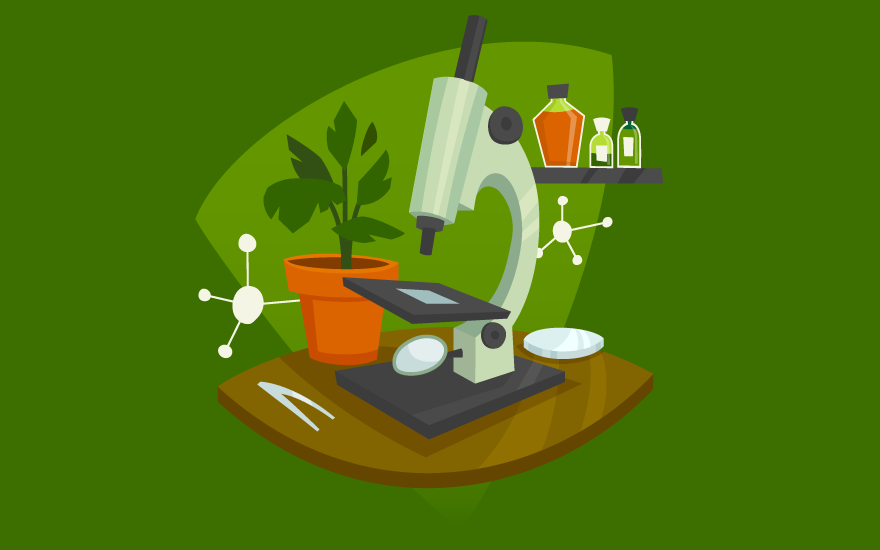
The scientific study of plants are called botany “Plants,” to most people, means a wide range of living organisms from the smallest bacteria to the largest tree – the giant sequoia trees. By this definition plants include: algae, fungi, lichens, mosses, ferns, conifers and flowering plants. Today scientists believe bacteria, algae and fungi are in their own distinct kingdoms, but most general botany courses, and most Botany Departments at colleges and universities, in both on-campus and online botany degree programs, still teach about these groups.
Because the field is so broad, there are many kinds of plant biologists and many different opportunities available. Botanists interested in ecology study interactions of plants with other organisms and the environment. Other field botanists search to find new species or do experiments to discover how plants grow under different conditions. Some botanists study the structure of plants. They may work in the field, concentrating on the pattern of the whole plant.
Plants have intrigued people for thousands of years. Plants provide aesthetic beauty as well as materials for our basic needs. Today our world presents new and complex problems that were never dreamed of a century ago.Air and water pollution increase while biological diversity is reduced. Recent progress in technology and molecular biology provide powerful new tools that can help us solve these and other challenging problems. Some of the tools you might learn to use include: electron microscopes, radioisotopes, digital imaging analysis, polymerase chain reaction, cell and tissue culture, satellite imaging and telemetry.
Careers in botany
One of the best things about plant science is the number of different specialties and career opportunities from which you can choose. This diversity allows people with different backgrounds, aptitudes, and interests to find satisfying careers in plant biology. More than many other scientific fields, botany continues to provide opportunities for women as well as men. There are few things more fulfilling than to work in a job that is both fun to do and a benefit to others.
Among the careers available to a person who enjoys the outdoors are positions as an ecologist, taxonomist, conservationist, forester, or plant explorer. Your work may take you to foreign and exotic lands. It may allow you to live and work in the great outdoors. A person with a mathematical background might find biophysics, developmental botany, genetics, modeling, or systems ecology to be exciting fields. Someone with an interest in chemistry might become a plant physiologist, plant biochemist, molecular biologist, or chemotaxonomist.
Many people do not realize that most of the basic biological processes are the same in both plants and animals. Plants, however, are easier to grow and manipulate.
Plant structure may appeal to a person who enjoys microscopy and the beauty of intricate form and design. Persons fascinated with microscopic organisms often choose microbiology, phycology or mycology. On a larger scale, ornamental horticulture and landscape design requires artistic use of plant form and color. A person concerned about the world food supply might study plant pathology (diseases) or plant breeding.
At larger universities there are frequently separate departments specializing in different applied sub-disciplines of botany. Some examples are: Agronomy (field crops), Horticulture (ornamentals, fruits and vegetables), Microbiology (microbes such as bacteria and fungi) and Plant Pathology (diseases of plants). Plant biologists who enjoy working with people have a wide range of opportunities in teaching and public service.
Current fields
Teaching botany is a challenging and rewarding career. A teaching botanist must understand a variety of sub-disciplines of the field and be able to explain them to students. This provides an opportunity to inspire new generations with an understanding of, and appreciation for, plants.
Many other careers for botanists do not involve teaching or research. Some botanists work in marketing or administration of plant-related industries such as pharmaceutical companies, seed companies, biotechnology firms, scientific publishers and biological supply houses. Other plant biologists work in museums, herbaria, and botanical gardens.
ANATOMY -microscopic plant structure
BIOCHEMISTRY -chemical aspects of plant life processes.
BIOPHYSICS -application of physics to plant life processes
CYTOLOGY -structure, function, and life history of plant cells.
ECOLOGY-relationships between plants and the world in which they live, GENETICS – plant heredity and variation. genetic study genes and itsfunction
MOLECULAR BIOLOGY – structure and function of biological macromolecules, including biochemical and molecular aspects of genetics
MORPHOLOGY – macroscopic plant form. Morphologists also study the evolution and development of leaves, roots and stems
PALEOBOTANY – biology and evolution of fossil plants.
PHYSIOLOGY – functions and vital processes of plants. Photosynthesis and mineral nutrition are two examples of subjects studied by plant physiologists
SYSTEMATICS – evolutionary history and relationships among plants
SYSTEMS ECOLOGY– uses mathematical models to demonstrate concepts like nutrient cycling.
TAXONOMY is the subdiscipline of identifying, naming, and classifying plants
BRYOLOGY – the study of mosses and similar plants. Bryologists study all aspects of these plants, including their identification, classification, and ecology.
LICHENOLOGY – the biology of lichens, dual organisms composed of both a fungus and an alga.
MYCOLOGY – the biology of fungi. Fungi have a tremendous impact on our world. They are crucial in the biosphere because they help recycle dead organic material. Some fungi are important producers of biological products such as vitamins and antibiotics
MICROBIOLOGY – the study of microorganisms. Microbiologists may be specialized by organism (for example, microbiologists that study bacteria) of by a branch of biology (for example, Microbial Ecology
PTERlDOLOGY – the study of ferns and similar plants. Pteridologists study all aspects of fem biology.
PHYCOLOGY – the study of algae, which are the base of the food chain in the aquatic environments of the world. Phycologists that study algae in oceans are sometimes called marine botanists.
Opportunities
Major employers of plant biologists are educational institutions, federal and state agencies, and industries. Job opportunities usually depend upon educational training and experience. New positions in botany are expected to increase at an above-average rate through the turn of the century.
Growing world population continues to increase the need for better food supplies. Environmental concerns, such as air, water and soil pollution, will create openings for ecologists in government and industry. The search for new drugs and medicines and useful genes for improving crop plants will continue to create a need for botanical explorers.
Educational institutions, High schools and community colleges have few openings for those who wish to teach specialized courses and there is little time or equipment for research activity. Nevertheless, for botanists who primarily enjoy teaching, such positions are very satisfying.
Most positions for professional plant scientists are in colleges and universities. Almost all colleges and universities offer courses in plant science and there are faculty positions for botanists who have different specialties. In addition, educational institutions employ botanists as researchers and as administrators.
Industry is the third major employer of plant biologists. Drug companies, the oil industry, the chemical industry, lumber and paper companies, seed and nursery companies, fruit growers, food companies, fermentation industries (including breweries), biological supply houses and biotechnology firms all hire men and women trained in botany. Recently the first genetically altered food crop, the FlavrSavr(tm) tomato, reached store shelves. This opens a new career field for botanists.
Botany offers many interesting and worthwhile career opportunities. The work is frequently varied and the surroundings pleasant. Because of the great diversity in the plant sciences, people with many different backgrounds, abilities, and interests can find a satisfying career in botany.
Today the range of job opportunities and potential earnings for plant biologists is wider than ever before. The American Institute for Biological Science 2003 salary survey “Compensation of Life Scientists in the United States of America”; indicates the 2003 median income (salary plus cash compensation, such as bonus, profit sharing, or both) for people with less than one year of experience was estimated at $33,000 and for those with 30 years or more $108,000. The median for all positions without supervisory responsibilities was $48,000 and for those supervising 10 or more professional and sub professional employees, the median income was $126,500.
REQUIREMENTS
Bachelor’s degree is the minimum requirement for most careers in botany. With these, positions are available as laboratory technicians or technical assistants in education, industry, government, museums, parks and botanical gardens. As in other fields, a wider range of positions is available with more education and experience. Many positions require a Master’s or Doctor’s degree. A Ph.D. is required for most teaching and research positions in colleges and universities.
CONCLUSION
The results of botanical research increase and improve our supply of medicines, foods, fibers, building materials, and other plant products. Conservationists use botanical knowledge to help manage parks, forests, range lands, and wilderness areas. Public health and environmental protection professionals depend on their understanding of plant science to help solve pollution problems.
Thus botany takes place in everyday life, economically useful and paves way for many jobs. So I choose the botany subject which is interesting and very resourceful.
Writer Bio: S. Anitha, pursuing M.Sc, Botany, Government Arts College, Coimbatore-641018 , She is an outstanding participant of International Essay Contest, October.
Write and Win: Participate in Creative writing Contest & International Essay Contest and win fabulous prizes.


